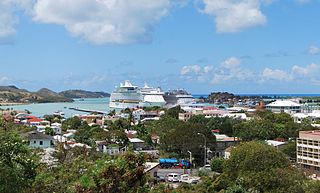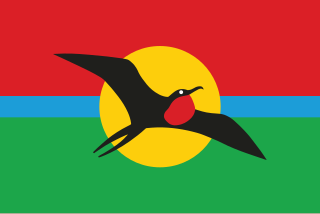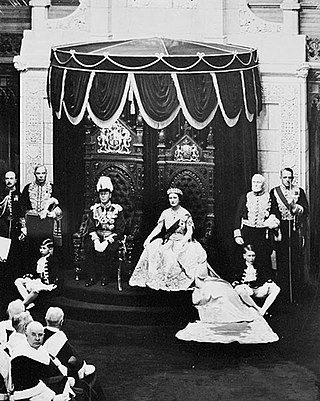
Antigua and Barbuda is a sovereign archipelagic country composed of Antigua, Barbuda, and numerous other small islands. Antigua and Barbuda has a total area of 440 km2, making it one of the smallest countries in the Caribbean. The country is mostly flat, with the highest points on Antigua being in the Shekerley Mountains and on Barbuda the Highlands. The country has a tropical savanna climate, with pockets of tropical monsoon in Antigua's southwest. Its largest city is St. John's.

St. John's is the largest city of Antigua and Barbuda. It is located in the western part of Antigua, surrounding St. John's Harbour. The city is Antigua and Barbuda's primate city, having a population of 22,219. St. John's also tends to dominate the parish of Saint John, which composes much of the city's metropolitan area. From its establishment after the French invasion in 1666, the city has rapidly grown, eventually replacing Falmouth as the island's dominant city.

Barbuda is an island and dependency located in the eastern Caribbean forming part of the twin-island state of Antigua and Barbuda as an autonomous entity. Barbuda is located approximately 30 miles (48 km) north of Antigua. The only settlements on the island are Codrington and its surrounding localities. Barbuda is a flat island with the western portion being dominated by Codrington Lagoon, and the eastern portion being dominated by the elevated plateau of the Barbuda Highlands, with salty ponds and scrubland spread throughout the island. The climate is classified as tropical marine.

Royal assent is the method by which a monarch formally approves an act of the legislature, either directly or through an official acting on the monarch's behalf. In some jurisdictions, royal assent is equivalent to promulgation, while in others that is a separate step. Under a modern constitutional monarchy, royal assent is considered little more than a formality. Even in nations such as the United Kingdom, Norway, the Netherlands, Liechtenstein and Monaco which still, in theory, permit their monarch to withhold assent to laws, the monarch almost never does so, except in a dire political emergency or on advice of government. While the power to veto by withholding royal assent was once exercised often by European monarchs, such an occurrence has been very rare since the eighteenth century.

The Antigua and Barbuda Labour Party (ABLP) is a political party in Antigua and Barbuda. The current leader of the party is Gaston Browne, who serves as the Prime Minister of Antigua and Barbuda. The party had previously been led by Lester Bird, who was chairman of the party since 1971, and was Prime Minister and political leader in 1994.

The governor-general of Antigua and Barbuda is the representative of the monarch of Antigua and Barbuda, currently Charles III. The governor-general is nominated by the prime minister, and appointed by the monarch. The governor-general exercises the powers of the monarch, and thus appoints ministers, senators, judges, and ambassadors; gives royal assent to legislation; and issues writs for election. The governor-general also exercises the powers of the commander-in-chief of the Antigua and Barbuda Defence Force. The governor-general serves at His Majesty's pleasure, although in practice is usually removed following the election of a new party into power.
A Royal Style and Titles Act, or a Royal Titles Act, is an act of parliament passed in the relevant country that defines the formal title for the sovereign as monarch of that country. This practice began in 1876, when the Parliament of the United Kingdom passed the Royal Titles Act. By that law, and the subsequent Royal Titles Act 1901 and Royal and Parliamentary Titles Act 1927, the monarch held one title throughout the British Empire. Following the enactment of the Statute of Westminster 1931, the governments of the now separate and independent realms sharing one person as sovereign agreed in 1949 that each should adopt its own royal style and title, which was done in 1952. As colonies became new realms, they passed their own royal style and titles acts. Most of the laws were created during the reign of Queen Elizabeth II.

Saint John, officially the Parish of Saint John, is a civil parish of Antigua and Barbuda, on the northwestern portion of Antigua island. Its capital is the city of St. John's. Saint John borders Saint Mary, Saint Peter, Saint George, and Saint Paul. Saint John faces the Caribbean Sea. Saint John is surrounded by some of Antigua's most premier beaches. Saint John had a population of 56,736 in a 2018 estimate, making it home to the majority of the population in Antigua and Barbuda.

The monarchy of Antigua and Barbuda is a system of government in which a hereditary monarch is the sovereign and head of state of Antigua and Barbuda. The current Antiguan and Barbudan monarch and head of state, since 8 September 2022, is King Charles III. As sovereign, he is the personal embodiment of the Crown of Antigua and Barbuda. Although the person of the sovereign is equally shared with 14 other independent countries within the Commonwealth of Nations, each country's monarchy is separate and legally distinct. As a result, the current monarch is officially titled King of Antigua and Barbuda and, in this capacity, he and other members of the Royal Family undertake public and private functions domestically and abroad as representatives of Antigua and Barbuda. However, the King is the only member of the Royal Family with any constitutional role.

The Antiguan Carnival is a celebration of emancipation from slavery, held annually on the island of Antigua. It is a thirteen-day festival of colorful costumes, beauty pageants, talent shows, and music. The festival begins in late July and ends the first Tuesday in August, known as Carnival Tuesday. Both Carnival Monday and Carnival Tuesday are public holidays on the island. Antiguan Carnival replaced the Old Time Christmas Festival in 1957, with hopes of inspiring tourism in Antigua and Barbuda. Some elements of the Old Time Christmas Festival remain in the modern Carnival celebrations.
An Appropriation Act is an Act of the Parliament of the United Kingdom which, like a Consolidated Fund Act, allows the Treasury to issue funds out of the Consolidated Fund. Unlike a Consolidated Fund Act, an Appropriation Act also "appropriates" the funds, that is allocates the funds issued out of the Consolidated Fund to individual government departments and Crown bodies. Appropriation Acts were formerly passed by the Parliament of Great Britain.
Antiguan and Barbudan nationality law is regulated by the 1981 Constitution of Antigua and Barbuda, the various Antigua and Barbuda Citizenship Acts, the Millennium Naturalisation Act of 2004, and various British Nationality laws. These laws determine who is, or is eligible to be, a national of Antigua and Barbuda. Antiguan and Barbudan nationality is typically obtained either on the principle of jus soli, i.e. by birth in Antigua and Barbuda; or under the rules of jus sanguinis, i.e. by birth abroad to a parent with Antiguan or Barbudan nationality. It can also be granted to persons with an affiliation to the country, by investment in the country's development, or to a permanent resident who has lived in the country for a given period of time through naturalisation. Nationality establishes one's international identity as a member of a sovereign nation. Though it is not synonymous with citizenship, rights granted under domestic law for domestic purposes, the United Kingdom, and thus the commonwealth, has traditionally used the words interchangeably.
Royal tours of Antigua and Barbuda by its royal family have been taking place since the 20th century. Elizabeth II, Queen of Antigua and Barbuda, visited the country thrice: in 1966, 1977, and 1985.

This article covers the history of Antigua and Barbuda from emancipation in 1833 until the British Leeward Islands were federalized in the early 1870s. During this era, the economy was significantly reformed, and many Afro-Antiguan villages were established. Antigua was often formally called the Colony of Antigua during this period. This is also when Barbuda began to merge with Antigua, and the communal land system was established.
This is a timeline of Antiguan and Barbudan history, consisting of various important political and historical events. To read about the background to these events, see the History of Antigua and Barbuda.

Federalism in Antigua and Barbuda refers to political theories that the central government of Antigua and Barbuda should share a certain degree of sovereignty with its parishes and dependencies under a form of federalism. These proposals were first made during the era of the Associated State of Antigua, prior to independence. However, due to disputes during the Barbuda Land crisis since 2017, members of the Barbuda People's Movement, the United Progressive Party, and other entities have proposed this in an effort to avoid Barbudan secession. In Antigua and Barbuda, the Federation of Saint Kitts and Nevis is usually used as an example of how an Antiguan and Barbudan federal system could work.

The Barbudan independence movement is a political movement that seeks the independence of Barbuda from Antigua. Proponents state that Barbudan independence would allow Barbudans to exercise their right to self-determination, especially after the start of the Barbuda land crisis, while opponents state that this movement would set a precedent for other small islands in the region to secede, and would deprive Antigua of critical resources.
The Redonda Annexation Act is an act of the Parliament of Antigua and Barbuda which annexed the uninhabited island of Redonda into the parish of Saint John. This is the last time the borders of Antigua and Barbuda were changed. It went into force on 26 March 1872.

The political history of Antigua and Barbuda covers the history of political movements and systems of government in Antigua and Barbuda. Since Antigua's colonisation in 1632, the archipelago has seen various governments and political conflicts, as well as democratic backsliding and attempts to redevelop the country. Now, Antigua and Barbuda is a fully independent unitary parliamentary monarchy.











